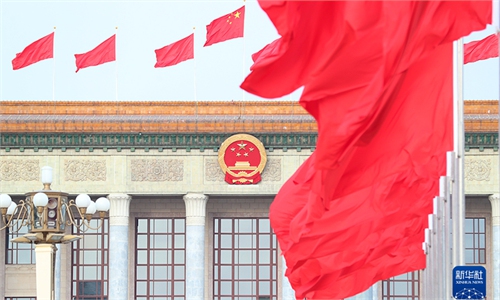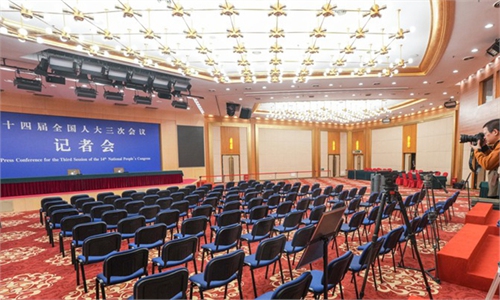In a turbulent world, the value of China’s two sessions gains increasing prominence: Global Times editorial

As the 2025 "two sessions" approach, a press center, which is in the Media Center Hotel on the north side of West Chang'an Avenue, Beijing, is officially opened on February 27, 2025. Photo: VCG
This week, China will enter the period of its annual "two sessions." The third session of the 14th National People's Congress (NPC) and the third session of the 14th National Committee of the Chinese People's Political Consultative Conference (CPPCC) will convene in Beijing on March 5 and March 4 respectively. This year marks the conclusion of the "14th Five-Year Plan" and the year of arranging for the "15th Five-Year Plan." At this critical juncture for further deepening reform comprehensively, China's two sessions bear the important task of building consensus and drawing up a blueprint. Amid the intensifying global geopolitical turmoil, China's two sessions will contribute stability and governance wisdom to the world.As a window to observe China's democratic politics, the two sessions are a vivid practice of the whole-process people's democracy. Nearly 3,000 NPC deputies and more than 2,000 members of the CPPCC will gather in Beijing to discuss domestic affairs. Among them are front-line industrial workers, farmers, business owners in the private sector, intellectuals and military personnel, representing all classes, industries and ethnicities in China. From NPC deputies going to the fields to listen to farmers' expectations for rural revitalization, to CPPCC members advocating for reduced burdens on small and medium-sized enterprises at the CPPCC members' passage; from the Supreme People's Court transforming suggestions into judicial policies for the protection of minors, to the inclusion of dual-use public infrastructure construction that can accommodate emergency needs in the government work report, these governance practices reflect the unremitting pursuit of "the most extensive, genuine and effective democracy."
The two sessions are known as China's political "wind vane" and economic "barometer," attracting significant attention from international mainstream media. Because it is not only a review and assessment of past achievements, but also an anchoring of the direction for future development. The government work report released at last year's two sessions proposed an economic growth target of "around 5 percent" and introduced a series of specific measures focusing on stabilizing employment, promoting consumption, and expanding domestic demand. The data released by the National Bureau of Statistics in January this year, indicating that GDP grew by 5 percent in 2024, shows that the Chinese government has accurately fulfilled its commitments and achieved its expected goals. The economic increment generated by China's 5 percent economic growth is equivalent to adding a medium-sized economy to the world in a year, contributing approximately 30 percent to global economic growth. Through the two sessions, China demonstrates stability, which is underpinned by the united and pragmatic efforts of the entire nation.
Recently, People's Daily Online conducted the 24th national two sessions survey. The results indicate that the three major hot topics - "livelihood guarantee," "anti-corruption," and "social governance" - have garnered significant attention. From addressing the challenges of the elderly and child care, safeguarding the rights of workers in new employment forms to supporting the green energy industry, the topics raised by NPC deputies and CPPCC members are rooted in grassroots research and reflect a high level of expertise. China's national governance continues to advance along a path of scientific and institutional development.
How to maximize consensus has increasingly become a governance challenge for many countries today. China, with its vast population, employs a democratic political system characterized by a governance loop of "suggestion-implementation-feedback," which continuously transforms the wisdom of over 1.4 billion people into momentum for national progress. In 2024, various departments under the State Council adopted over 5,000 suggestions and proposals from NPC deputies and CPPCC members and introduced more than 2,000 relevant policies and measures, addressing a series of key and difficult issues related to reform, development, and the vital interests of the people. The process of moving from "hearing in the heart" to "writing on paper" to "implementing on the ground" is a true reflection of the principle of "putting people first."
With the "Five-Year Plan" as a guiding framework and the "two sessions" mechanism to build consensus, China has integrated "continuous struggle" into its genes, thereby providing the world with a steady source of developmental momentum.
A strong sense of political responsibility and a pragmatic style distinguish China's democratic politics from "empty talk democracy" and "veto politics." This combination of order and vitality serves as the anchor that enables China to maintain economic resilience and social stability despite changes in the external environment, and it represents a contribution of China's democratic system to the world.
From stabilizing the economy to enhancing people's livelihoods, from breaking through via innovation to achieving win-win openness, China's progress has never ceased. In this hopeful spring, China is demonstrating through action that development is for the people and reform relies on the people. The two sessions in China provide the world with a window to observe Chinese political civilization through their steady trajectory, reflecting the ongoing transformation of the people's aspirations for a better life into reality.


